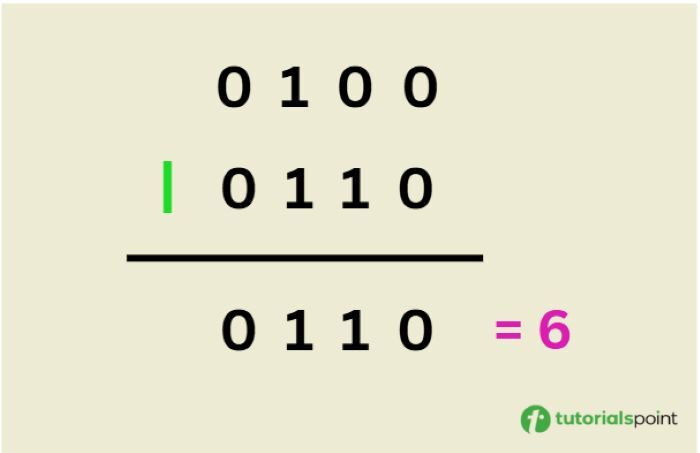
 Data Structure
Data Structure Networking
Networking RDBMS
RDBMS Operating System
Operating System Java
Java MS Excel
MS Excel iOS
iOS HTML
HTML CSS
CSS Android
Android Python
Python C Programming
C Programming C++
C++ C#
C# MongoDB
MongoDB MySQL
MySQL Javascript
Javascript PHP
PHP
- Selected Reading
- UPSC IAS Exams Notes
- Developer's Best Practices
- Questions and Answers
- Effective Resume Writing
- HR Interview Questions
- Computer Glossary
- Who is Who
What is different in | and OR operators in Python?
The OR and (|) are logical operators in Python. The difference between these two is that OR is a Logical OR operator, and | is a Bitwise OR Operator. Both operators are used to perform different operations. In this article, we will explore the behavior of these operators and their differences.
OR Operator in Python
The OR operator in Python returns true if one of the operands is true and false if both operands are false. This operator needs two values or operands to perform the operation and return the result.
OR Operator Example
The following is an example of an OR operator in Python. In the example below, both variables have been assigned Boolean values, and based on these values, the OR operator prints the resultant text.
is_hungry = False
is_thirsty = True
if is_hungry or is_thirsty:
print("Time for a snack or a drink!")
else:
print("All good for now!")
Following is the output of the above program -
Time for a snack or a drink!
The Pipe (|) Operator in Python
The | (pipe) symbol represents the Bitwise OR Operator in Python. This operator operates over the bits. It compares the binary representation of equal-length bit patterns. If both bits in the same position are 0, the result is 0, and if one or both are 1, the result will be 1.

Example of | Operator
The following is a simple example of the Bitwise OR operator. The Bitwise OR Operator compares the bits of a and b, and it returns 6(0110 in binary) because the second and third bits from the right are 1, and the rest are 0.
a=4 b=6 print(a|b)
Output
6
Difference Between OR and | Operator
In the above section, we have understood the concept and working of these two operators. In this section, we will see some differences between the OR and | operators.
| Logical OR Operator | Bitwise | operator |
|---|---|
| This operator is one of the types of Logical operators. | This operator is one of the types of Bitwise operators. |
| This operator operates on Boolean values or expressions. | This operator operates on bits or Binary values. |
| This operator checks whether at least one operand is true, and based on that, returns a boolean value. | This operator returns a new value based on the comparison of bits of numbers. |
| These operators are useful in control flow and short-circuiting | These operators are useful for Bit-level operations and not for short-circuiting. |

